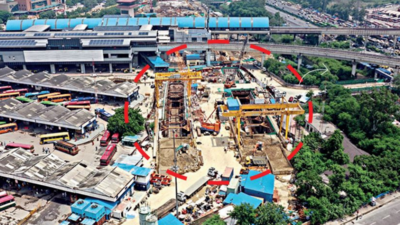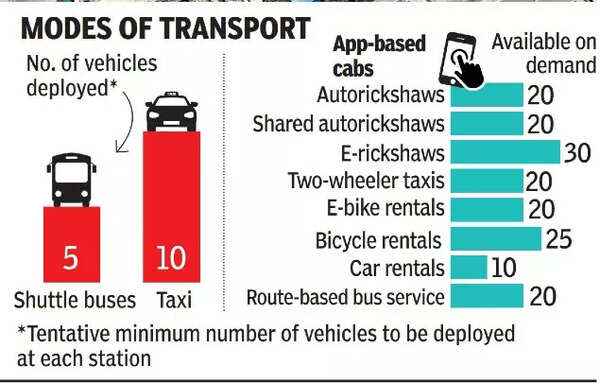Top Searches
- News
- City News
- delhi News
- Not just high-speed trains, Delhi-Meerut RRTS to get 11 green last-mile services
Not just high-speed trains, Delhi-Meerut RRTS to get 11 green last-mile services

App-based cab aggregators will ensure availability of cabs on demand at RRTS stations
NEW DELHI: E-rickshaws, two-wheeler taxis, shuttle buses, app-based cabs, electric bikes and more—the stations on the 82km Delhi-Meerut Regional Rapid Transit System (RRTS) corridor will provide last-mile connectivity through various modes of transport to suit different needs of commuters.
National Capital Region Transport Corporation (NCRTC), which is executing the project, plans to provide reliable and comfortable feeder services by partnering with eco-friendly vehicle operators or aggregators. “NCRTC will sign MOUs with different service providers depending on the services they are providing. For example, a service provider may be brought on board for two services, while another may be for just one,” an NCRTC official said. While currently these services will be made available at the priority section between Sahibabad and Duhai, which is expected to become operational next year, similar feeder services will be adopted for the rest of the corridor too, he said.
 NCRTC has zeroed down on 11 different feeder services, beginning with point-to-point shuttle-bus services to connect offices, IT corporate parks, colleges, townships, etc. It plans to have services of standard and premium electric buses or those fuelled by CNG, operating to and from RRTS stations. Route-based bus services will also be available from the stations, the official said.
NCRTC has zeroed down on 11 different feeder services, beginning with point-to-point shuttle-bus services to connect offices, IT corporate parks, colleges, townships, etc. It plans to have services of standard and premium electric buses or those fuelled by CNG, operating to and from RRTS stations. Route-based bus services will also be available from the stations, the official said.
App-based cab aggregators will ensure availability of cabs on demand at RRTS stations. These will be electric or CNG-run vehicles that will be able to accommodate four to six passengers and take them to any permissible destination. The stations will also have the facility of metered or pre-paid taxi and autorickshaw services with no limit on the distance to be travelled. While electric or CNG mini and maxi cabs with a capacity to ferry four to six passengers will be available at the stations, the autorickshaws too will have to be electric or CNG-run.
Apart from e-rickshaws, three- and four-wheeler vehicles will be available on sharing mode. The operators or aggregators of these vehicles will have to go to and from RRTS stations in multiple directions following a hub-and-spoke or loop-route concept, the official said. These vehicles aim to connect various localities with these stations, he added.
NCRTC also plans to offer services of two-wheeler taxi services at RRTS stations, in which scooter or motorbike operators will provide point-to-point mobility on demand and charge according to a kilometre-based chart. These two-wheeler taxis will also help in commuting to nearby localities.
The corporation proposes to have bicycles, e-bicycles, e-scooters and e-bike rental services at the stations. Commuters will be able to hire these at a pre-decided fare based on a per-kilometre or per-hour basis. There will be rental services in place to give cars in all sizes like hatchback, sedan, SUV, etc, to commuters for a short period. Only electric, CNG or any other green-fuelled cars will be available. They will be fitted with GPRS navigation systems, the official said.
The official said that NCRTC may provide space for pick-up and drop-off bays, parking of vehicles, installation of battery charging infrastructure, etc, at these RRTS stations. This is subject to availability and feasibility, the official added.
National Capital Region Transport Corporation (NCRTC), which is executing the project, plans to provide reliable and comfortable feeder services by partnering with eco-friendly vehicle operators or aggregators. “NCRTC will sign MOUs with different service providers depending on the services they are providing. For example, a service provider may be brought on board for two services, while another may be for just one,” an NCRTC official said. While currently these services will be made available at the priority section between Sahibabad and Duhai, which is expected to become operational next year, similar feeder services will be adopted for the rest of the corridor too, he said.

App-based cab aggregators will ensure availability of cabs on demand at RRTS stations. These will be electric or CNG-run vehicles that will be able to accommodate four to six passengers and take them to any permissible destination. The stations will also have the facility of metered or pre-paid taxi and autorickshaw services with no limit on the distance to be travelled. While electric or CNG mini and maxi cabs with a capacity to ferry four to six passengers will be available at the stations, the autorickshaws too will have to be electric or CNG-run.
Apart from e-rickshaws, three- and four-wheeler vehicles will be available on sharing mode. The operators or aggregators of these vehicles will have to go to and from RRTS stations in multiple directions following a hub-and-spoke or loop-route concept, the official said. These vehicles aim to connect various localities with these stations, he added.
NCRTC also plans to offer services of two-wheeler taxi services at RRTS stations, in which scooter or motorbike operators will provide point-to-point mobility on demand and charge according to a kilometre-based chart. These two-wheeler taxis will also help in commuting to nearby localities.
The corporation proposes to have bicycles, e-bicycles, e-scooters and e-bike rental services at the stations. Commuters will be able to hire these at a pre-decided fare based on a per-kilometre or per-hour basis. There will be rental services in place to give cars in all sizes like hatchback, sedan, SUV, etc, to commuters for a short period. Only electric, CNG or any other green-fuelled cars will be available. They will be fitted with GPRS navigation systems, the official said.
The official said that NCRTC may provide space for pick-up and drop-off bays, parking of vehicles, installation of battery charging infrastructure, etc, at these RRTS stations. This is subject to availability and feasibility, the official added.
FOLLOW US ON SOCIAL MEDIA
FacebookTwitterInstagramKOO APPYOUTUBE
Start a Conversation
end of article









